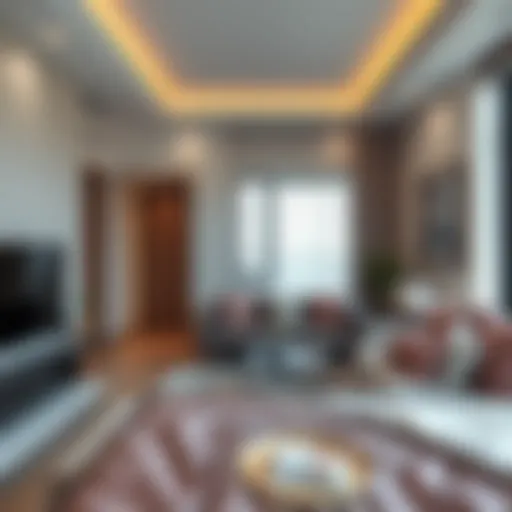Understanding Apartment Prices in Dubai's Real Estate


Intro
Navigating the landscape of apartment costs in Dubai can feel like a maze. With soaring skyscrapers and a magnetic allure, the city attracts a plethora of buyers, renters, and investors. As this vibrant metropolis continues to evolve, understanding the nuances of its complex real estate market becomes imperative.
In this guide, we’ll unravel the layers of what drives apartment prices in Dubai. From neighborhood dynamics to market trends, each detail offers potential insights that can shape decisions for expatriates, investors, and locals alike. This is more than just numbers; it’s about recognizing patterns, understanding the implications of property laws and making the most of your investment.
The journey begins by examining current trends and predictions for the market, giving insights that can aid in decision-making processes. We'll dig deep into areas that are currently buzzing and uncover investment opportunities that promise profitability. Tune in as we set the stage for figuring out costs that not only meet your expectations but hopefully even exceed them.
Prelude to Dubai's Real Estate Market
Dubai's real estate market is as vibrant as the city's skyline, characterized by a blend of luxury developments and affordable housing options. Understanding this market is crucial for anyone, be it investors, expatriates, or first-time buyers, who aim to navigate the labyrinth of property transactions in this dynamic emirate.
The allure of Dubai lies not just in its iconic architecture or tax-free status, but also in its strategic position as a global business hub. Investors from across the globe are drawn to the opportunities, as Dubai continually attracts foreign capital. Therefore, being well-informed about the intricacies of the local real estate market can mean the difference between a wise investment and a financial misstep.
Key Elements to Consider
When diving into Dubai's real estate, several factors demand attention:
- Market Trends: Keeping an eye on fluctuations in prices can uncover fruitful opportunities. For instance, recent developments have shown price adjustments depending on neighborhood demand and international economic conditions.
- Regulatory Environment: Understanding the laws surrounding property ownership can help prevent legal troubles. There are specific guidelines governing foreign ownership that potential buyers must navigate.
- Economic Influences: Global economic trends or local developments like Expo 2020 have far-reaching impacts on property costs, making it essential to stay updated on these events.
As one could say, "knowledge is power," and in a city like Dubai, being educated about the real estate market can empower you to make informed choices that align with your financial ambitions.
In summary, understanding Dubai's real estate market is not merely an academic exercise; it’s a practical tool that can enhance decision-making. The multifaceted nature of apartment prices in this cosmopolitan city presents both challenges and opportunities for prospective buyers and investors alike.
Current Average Apartment Costs
Understanding the current average apartment costs in Dubai is crucial for anyone looking to make informed decisions in the real estate market. Prices fluctuate based on various factors including location, housing type, and the overall economy. For investors, renters, or buyers, grasping these dynamics can distinguish a good deal from a poor investment. Knowing average costs helps in budgeting and negotiating better terms based on market realities.
Overview of Prices in Different Areas
In Dubai, real estate prices can vary dramatically based on area. If someone is scoping rental options, the variance in pricing can be the difference between living the high life in the wealthy districts or settling for more modest accommodations.
- Downtown Dubai - Typically, one of the priciest spots. Expect studio apartments to hover around AED 75,000 annually, while bigger units can set you back even further.
- Dubai Marina - This area blends leisure with luxury. A one-bedroom unit might range from AED 85,000 to AED 120,000 annually. The views of the water are often worth the extra cash.
- Jumeirah Village Circle - On the flip side, areas like JVC offer competitive pricing; studios can be found for around AED 40,000, making it a popular choice for young professionals and families alike.
Many potential apartment dwellers might find themselves drawn to these price points and locations when doing their homework on where to plant roots in this sprawling metropolis.
Renting vs. Buying Dynamics
When it comes to the ever-pressing question of renting versus buying, the landscape varies widely in Dubai. It’s as if two different worlds exist within the same city.
- Renting is short-term, flexible, and often much easier for expatriates or those new to the city. However, like pouring money down the drain, renting lacks the investment aspect.
- Buying property, on the other hand, can seem like a high mountain to climb but comes with its own set of rewards. The capital appreciation in some areas can make it a worthwhile investment over time.
For many, the choice hinges on their long-term plans. Are they settling in for the long haul or just passing through?
"Owning property in Dubai can serve as a viable investment strategy, especially with its ever-evolving economy."
Both renting and buying have their merits, but understanding current costs makes it clear which option aligns with your lifestyle and financial goals.
Key Factors Influencing Apartment Prices
Understanding what drives apartment prices in Dubai is paramount for anyone looking to navigate this bustling real estate landscape. Whether you are a prospective buyer, an astute investor, or even a rental agent, grasping the nuances of the market can greatly impact your decision-making process. The factors that influence apartment costs can be varied and multifaceted, but knowing them can help you identify opportunities and pitfalls along the way.
Location and Its Importance
Location is often touted as the most important factor in real estate, and this rings especially true in Dubai. The city’s diverse neighborhoods each offer unique lifestyles, amenities, and accessibility to business hubs. For instance, living in areas like Downtown Dubai or Palm Jumeirah not only gives residents a taste of luxury but often comes with a hefty price tag. Conversely, districts like International City or Deira can provide more budget-friendly options without sacrificing community vibrance.
Here are some key points to consider:
- Accessibility: Proximity to public transport, highways, and airports can affect demand significantly.
- Safety: Neighborhoods that are perceived as safe often see higher prices due to desirability.
- Schools and Healthcare: Access to quality schools and healthcare facilities can make some areas more attractive for families.
In a nutshell, location is more than just a spot on the map; it shapes the living experience and can be a deal-maker or breaker.
Quality of Construction and Amenities
The adage "you get what you pay for" undoubtedly holds weight in Dubai’s unique real estate market. High-quality construction not only ensures durability but also enhances aesthetic appeal and functionality. Modern apartments often come loaded with amenities such as swimming pools, gyms, and smart home technologies, which add to their market value.
Key considerations include:
- Type of Materials Used: High-end materials often lead to higher prices; marble finishes and hardwood floors usually indicate a premium.
- Amenities Offered: Residential buildings that provide more services like concierge, security, and recreational activities can demand higher rents or sale prices.
- Sustainability Features: In today’s eco-conscious world, properties that are energy-efficient or have green certifications can attract a niche market willing to invest more.
Ultimately, quality construction and additional perks can elevate an apartment's status and price, making it crucial to assess these elements when evaluating costs.
Market Demand and Supply Forces


Much like a seesaw, supply and demand are at the heart of real estate pricing. In Dubai, where the government is continually developing new projects, understanding the current supply will give you insight into market trends. If demand outstrips supply, prices will inevitably rise. Conversely, if there is a surplus of available apartments, prices may drop accordingly.
A few elements to keep in mind:
- Economic Conditions: Changes in the global economy can have ripple effects that impact local markets.
- Population Growth: A growing expatriate community can drive demand for rentals and purchase of apartments, putting upward pressure on prices.
- Foreign Investment Trends: Dubai often sees fluctuations based on international buyers’ interests, which can affect price dynamics.
In summary, stark awareness of the supply-demand relationship can provide critical insights for anyone looking to make informed decisions in Dubai's ever-changing market environment.
"In real estate, understanding the market dynamics is not just an advantage; it’s essential for survival."
Neighborhood Analysis
Understanding the neighborhoods in Dubai is crucial for anyone looking into the apartment market. Each area offers something different, catering to various preferences and budgets. The choice of neighborhood significantly affects not only the rental or purchase cost but also the quality of life one can expect. A well-planned neighborhood can mean good schools, shopping, and transport links, while a less-desired area could imply higher crime rates or limited services. In this section, we will closely examine some of Dubai's well-known districts, spanning from opulent locales to budget-friendly spots, and assess their respective merits and downsides.
High-End Districts
Downtown Dubai
Downtown Dubai is one of the crown jewels of the city. Home to the iconic Burj Khalifa and the dazzling Dubai Mall, the area offers both luxury and lifestyle. The high-rise apartments here come with breathtaking views and top-notch amenities, making it a coveted spot for expatriates and affluent locals alike.
A key characteristic of Downtown Dubai is its vibrant lifestyle. Residents enjoy not just the stunning architecture but also a plethora of entertainment options. However, this luxurious lifestyle comes at a price. Rental costs in this area can be steep, making it less accessible for budget-conscious individuals.
One significant aspect is the proximity to the Dubai Fountain, which offers a unique experience, particularly at night. But do keep in mind that the traffic can be quite a hassle during peak hours. For those who can afford it, Downtown represents luxury living at its finest.
Palm Jumeirah
The Palm Jumeirah, often dubbed the "Eighth Wonder of the World," is a landmark replete with upscale villas and luxury apartments. Its unique palm-shaped layout is complemented by sandy beaches and opulent facilities, including high-end restaurants and spas.
One of the biggest draws of this area is its exclusivity; many consider it a quintessential Dubai experience. The lifestyle is idyllic, with beach access right at your doorstep. However, this comes at a premium, so affordability can be a sticking point for many.
The community here is close-knit, fostering a sense of belonging, but that also means limited availability if you are hunting for a decent rental deal. Added to that, some may find the distance from the city center to be a disadvantage, but the trade-offs for a luxury lifestyle often make it worth the while.
Dubai Marina
Dubai Marina is a hub of modernity, elegance, and sophistication. This area is known for its stunning waterfront views and exciting nightlife, making it a popular choice among younger professionals. The vibrant atmosphere here is compelling, with cafes, restaurants, and shops lining the marina.
What sets Dubai Marina apart is the lifestyle it offers: gathering spots for joggers, cycle paths, and boats bobbing in the water create a picturesque scene. However, while it can be a fantastic place to live for socialites, those seeking peace and quiet might find the area a bit too bustling.
Moreover, rental prices are generally more affordable than in Downtown Dubai or Palm Jumeirah, though they still carry a premium due to the area's desirability. Given its amenities and social scene, it remains an attractive option for many.
Mid-Range Options
Jumeirah Village Circle
Jumeirah Village Circle, or JVC as it’s often called, provides a good balance of affordability and amenities. Its layout consists of landscaped parks and wide roads, creating a pleasant environment for families and young professionals.
One of the appealing characteristics of JVC is its reasonable pricing compared to other areas. It's a growing community, which makes it perfect for those who want to settle in a developing area. However, as amenities expand, so too may the costs, so it's wise to keep an eye on market trends.
The potential for appreciation in property values is an interesting proposition here, along with a range of options in housing types. The downside, however, is that its location can be somewhat isolated, which means you might have to travel a bit to access Dubai's central attractions.
Al Barsha
Al Barsha offers a mix of diverse property types, making it suitable for various budgets. Known for its proximity to the Mall of the Emirates and the Dubai Metro, Al Barsha is a go-to for expatriates and locals alike.
The area boasts good schools and healthcare facilities, striking the right chords for families. It’s a well-managed community, and the rental prices reflect its status as a mid-range options. However, the over-commercialized environment can feel a bit crowded, with restaurants and shops filling every corner.
The strength lies in its accessibility and facilities but, like any urban setting, this may come with noise and traffic issues.
Dubai Sports City
Dubai Sports City is quite unique since it focuses on a sports-centric lifestyle. This area is well-suited for sports enthusiasts, featuring state-of-the-art venues and multiple academies.
The key characteristic of Dubai Sports City is the community; it draws those who share a passion for fitness and sports, thus creating a vibrant atmosphere. Moreover, rental prices are quite inviting, making it an attractive option for those looking for budget-friendly housing in a purposeful environment.
However, one must note that while the potential for increased property value exists, the area itself is still developing. So, amenities might be limited at present compared to other areas.
Budget-Friendly Areas
International City
International City is often considered one of the most budget-friendly residential areas in Dubai. It's comprised of several themed clusters, each representing a different country, lending an unusual flair to the community.
The affordability is its standout feature, making it ideal for those on a tight budget. The area is not heavily commercialized, which keeps costs down, but this also means fewer amenities compared to more upscale areas.


However, for individuals and families seeking a place to call home without breaking the bank, International City offers a unique option worth exploring. The only downside might be the perceived distance from the city center.
Al Qusais
Al Qusais presents another accessible living option, combining residential homes with commercial and industrial spaces, giving it a distinct local vibe. One defining characteristic is its established nature, providing many essential services.
Affordability is again a main feature, with rental prices generally lower than in many other areas. It caters well to families and working adults, providing good schools and hospitals. However, some may find it less vibrant than the more popular neighborhoods, which might not suit everyone’s lifestyle preferences.
Deira
Deira is one of the oldest neighborhoods in Dubai. While it may not shine with the glamor of some other areas, it offers rich cultural experiences and vibrant markets, making it an intriguing option.
Affordability is what draws many residents to Deira. It allows for a budget-conscious lifestyle while still being part of a historical district. However, living here does come with trade-offs, such as potential traffic congestion and noise from bustling markets.
In summary, each neighborhood in Dubai holds distinct features, advantages, and disadvantages. For a better understanding of the apartment market, it is vital to consider personal needs, budget, and lifestyle preferences while making a choice.
By analyzing these neighborhoods, potential tenants and buyers can better navigate the complex real estate landscape in Dubai.
Comparative Property Types
Understanding the various types of apartments available in Dubai is crucial for anyone looking to make a property investment or find a place to settle down. The market is rich and diverse, offering everything from cozy studio apartments to opulent luxury units. Each property type comes with its own advantages and drawbacks, catering to different preferences, budgets, and lifestyles. Familiarizing yourself with these options helps buyers and renters align their choices with their financial capability and lifestyle needs.
Studio Apartments
Studio apartments are often seen as the ideal choice for young professionals, students, or anyone interested in city life with a tighter budget. Generally compact, a studio in Dubai combines living, sleeping, and often cooking areas into a single space. This design can foster efficiency, making daily living simpler. One of the significant benefits is affordability—studio apartments typically come with lower costs compared to larger units, making them an attractive option for those just starting their careers.
However, buyers should keep a few things in mind:
- Space Limitations: With less square footage, storage can be a challenge.
- Privacy Concerns: Living in a single room may not be conducive for everyone, especially couples or those needing personal space.
Indeed, the appeal varies widely depending on individual circumstances.
One-Bedroom Units
One-bedroom units strike a balance between space and cost, offering more room than studios while still being relatively affordable. They provide a separate bedroom, kitchen, and living area, allowing for greater comfort and more privacy. This type can be particularly appealing to expatriates or couples seeking a home in Dubai without breaking the bank.
Consider these elements:
- Ideal for Couples: The extra space is comfortable for two while also providing room for guests.
- Potential for Growth: As life circumstances change—be it job relocations or growing families—these units can serve as a more permanent residence.
However, prospective tenants or buyers should weigh the trade-offs. While the price is generally reasonable, high demand in desirable areas may result in elevated costs.
Luxury Apartments
Luxury apartments in Dubai are synonymous with opulence. These properties often come equipped with high-end finishes, state-of-the-art facilities, and exclusive amenities such as pools, gyms, and 24/7 concierge services. For those looking to invest significantly in real estate, these types of apartments can provide both a status symbol and a robust asset.
Nevertheless, luxury apartments might not be for everyone:
- Higher Costs: Purchase prices and monthly rents tend to be steep, which may not align with every budget.
- Market Volatility: The luxury market can be fickle, with property values subject to shifts based on global economic conditions.
In summary, whether it's the practicality of studio apartments, the comfort of one-bedroom units, or the lavishness of luxury apartments, understanding these comparative property types is key for success in Dubai's real estate landscape. Investing adequate time to analyze options will pay off in the long run, ensuring that buyers or tenants make decisions that align with their financial goals and lifestyle preferences.
"In real estate, success isn't about timing the market but rather finding the right property at the right time." - Author Unknown
For further insights and data on property types in Dubai, you may find valuable information at Dubai Land Department or check discussions on platforms like Reddit.
Impact of Economic Factors
Understanding the impact of economic factors is crucial when it comes to assessing apartment costs in Dubai. The interplay between local and global economic conditions can paint a vivid picture of market trends. As Dubai continues to forge its path as a pinnacle of real estate investment, economic indicators become the guiding stars for prospective buyers and investors. Knowing how global economic shifts affect local prices can empower stakeholders to make informed decisions, greatly influencing their approaches to investing or renting.
Global Economic Trends
Global economic trends cast a long shadow on the local market. Economic health worldwide, characterized by fluctuating currency values, trade policies, and interest rates, can inevitably affect Dubai's appeal to international buyers. For instance, when oil prices soar, nations relying on oil revenues often experience an influx of cash, leading to increased purchasing power in foreign property markets like Dubai. Conversely, economic downturns can deter investors, resulting in stagnant or reduced apartment prices.
It's vital to keep an eye on the economic forecasts by institutions such as the International Monetary Fund or World Bank. These projections serve as a barometer of where the market might head, enabling investors to anticipate potential opportunities or threats.
Local Economic Developments
Expo Effects
The Expo 2020 phenomenon significantly enriched the local economy. Set against a global backdrop, it sought to showcase innovation, infrastructure, and investment opportunities. The expo revitalized many sectors, from construction to hospitality. With millions flocking to Dubai to witness this grand event, a surge in tourism translated into increased demand for short-term rentals and accommodation.
A prominent feature is how it catalyzed improvement in infrastructure. Streets, public transport, and leisure facilities received considerable upgrades, making neighborhoods more attractive to potential residents. This aspect not only elevated property values but also laid the groundwork for long-term economic benefits by increasing overall demand in the housing market.
However, the challenge lies in what happens after such an investment blitz—whether the demand persists or fizzles out post-Expo.


Tourism Impact
Tourism remains the lifeblood of Dubai's economy, directly affecting apartment costs. A robust tourism sector brings in international visitors, many of whom seek temporary accommodations that drive up rental prices. Notably, with events like Expo 2020 and ongoing efforts to position Dubai as a tourist hotspot, the influx of visitors bolsters the local economy and propels housing demand.
In essence, the influx of travelers stimulates various sectors. It leads to heightened competition for rental properties, subsequently driving prices higher, particularly during peak seasons. Yet, it’s worth noting the drawback of excessive reliance on tourism, as market fluctuations during global events can sway demand dynamically.
In summary, both global and local economic factors can significantly impact apartment costs in Dubai. A thorough understanding of these dynamics, especially the local developments post-Expo and the tourism sector's influence, serves as an essential guide for investors and buyers looking to navigate the complexities of Dubai's real estate landscape.
Regulatory Environment
The regulatory environment surrounding apartment costs in Dubai plays a pivotal role in shaping the real estate landscape. Understanding the laws and regulations governing property ownership and leasing agreements not only safeguards the interests of investors, buyers, and renters but also contributes to a stable market. Having clarity about these regulations can help mitigate risks and enhance property value appreciation over time.
Property Ownership Laws
Navigating the property ownership laws in Dubai can feel like grasping at straws if you're uninformed. However, the laws are relatively straightforward once you get a handle on them. For expatriates, the law allows for 100% foreign ownership in designated areas. This paved the way for various investment opportunities, attracting a global clientele seeking to own a slice of this glitzy emirate.
Here are some key aspects of the property ownership laws:
- Freehold vs. Leasehold: Dubai features both freehold and leasehold properties. Freehold ownership gives full ownership rights, whereas leasehold typically restricts the property ownership to a limited time frame—most often for 99 years.
- Regulatory Bodies: The Dubai Land Department oversees property transactions, ensuring that titles are clear and lawful. Moreover, the Real Estate Regulatory Authority (RERA) enforces guidelines to protect buyers and sellers.
- Usage Rights: Owners must abide by zoning regulations that dictate how their properties can be utilized, impacting rental potential and resale value.
Familiarity with these laws is essential for anyone considering investing in Dubai real estate.
Tenant Rights and Responsibilities
Equally important in the regulatory environment are tenant rights and responsibilities, which are often overlooked but critical for maintaining a healthy rental market. Tenants in Dubai enjoy several protections that can enhance their living experience. However, ignorance of these rights can lead to disparities in the landlord-tenant relationship.
Tenants have the right to:
- A Fair Lease Agreement: Any lease must clearly outline terms, conditions, and obligations, protecting both parties from misunderstandings.
- Maintenance and Repairs: Landlords are obligated to maintain the property, ensuring it is safe and habitable, which includes timely repairs.
- Security Deposits: The law stipulates that any security deposit should be handled appropriately, with clear guidance on its return post-tenancy.
On the flip side, tenants are responsible for:
- Timely Payments: Rent must be paid on time as stipulated in the lease agreement to avoid additional charges or legal actions.
- Care of Property: Tenants must keep the property in good condition, which encompasses routine maintenance as agreed upon.
- Respecting the Landlord's Rules: Each property may have specific rules regarding modifications or usage, and tenants must adhere to these.
Understanding these rights and responsibilities cultivates trust and transparency, promoting harmonious living arrangements.
In summary, the regulatory landscape in Dubai serves as a backbone for the real estate market, ensuring that established rules are adhered to by both landlords and tenants. Those who take the time to familiarize themselves with these details can find themselves better positioned to make informed and strategic property decisions that align with their investment goals.
Investment Opportunities
Investing in real estate can seem daunting, especially in a vibrant city like Dubai. The dynamic nature of its market opens up a world of possibilities. This section takes a closer look at investment opportunities in Dubai’s apartment market, shedding light on specific areas worth your attention, as well as emerging trends in short-term rentals.
Emerging Areas for Future Investment
The heart of Dubai's growth lies in areas that are still developing or being revitalized. Investors are increasingly looking towards these zones as potential goldmines. Here are some of the most notable emerging areas:
- Dubai South: Once known mainly for the Expo 2020 site, this area is now poised for expansion, with infrastructure developments that promise to draw businesses and residents alike. The influx of new projects suggests potential for high returns.
- Dubai Creek Harbour: This area is being marketed as the future of Dubai. With its beautiful waterfront views and plans for low-rise residential, this might be an attractive pick for those looking at long-term holds.
- Dubai Silicon Oasis: Attracting tech-focused companies, this area offers affordable housing with a wide range of amenities. Investors hope that as tech firms continue to flock here, property values will increase.
These neighborhoods exemplify the ongoing transformation and growth of Dubai. Taking note of planned developments, infrastructure improvements, and community initiatives will buffer your investment choice against potential risks.
Short-Term Rentals and AirBnB
The rise of short-term rentals, particularly through platforms like AirBnB, has radically shifted the landscape for investors. In a city bustling with tourists and expats, this segment provides a unique opportunity to tap into the influx of visitors seeking temporary accommodations. Consider the following:
- Regulatory Framework: Knowing the laws governing short-term rentals is crucial. Ensure your investment aligns with local regulations to avoid potential fines. For example, in some areas, property owners need to register with the Dubai Tourism and Commerce Marketing.
- Profit Margins: The potential for income through short-term rentals can be significant, particularly in high-demand areas near attractions. Properties that blend luxury with local experiences can fetch premium rates, especially during peak tourist seasons.
- Occupancy Rates: Analyzing occupancy trends is key. Locations that attract a consistent flow of travelers, like Downtown and Marina, may yield higher returns than less frequented areas.
Short-term rentals can lead to impressive capital returns, but volatility is part of the game. Market fluctuations, seasonality, and economic factors can all play a role in your income stream.
Investors should carefully assess all facets of the short-term rental market as they navigate their opportunities. Make informed choices to ensure your investments remain lucrative amidst the evolving tourism landscape of Dubai.
The End and Future Outlook
The conclusion and future outlook section serves as a crucial wrap-up for the comprehensive analysis of apartment costs in Dubai. This part synthesizes all the insights gathered throughout the article, reiterating the importance of understanding the dynamics that steer prices in this vibrant real estate market. It provides prospective buyers, sellers, and investors a chance to reflect on previously discussed elements, offering clarity on the factors that influence their real estate ventures.
In summarizing the key points, it becomes apparent that various attributes—from location to market trends—form a complex tapestry that defines the real estate landscape in Dubai. For instance, one might observe the disparity in prices between the luxurious Palm Jumeirah and the budget-friendly International City, emphasizing the role of neighborhood characteristics in property valuation. Additionally, the impact of economic factors, both globally and locally, shows that the real estate market is responsive to international financial climates and local developments like the Expo 2020 event.
Summary of Key Points
- Location matters: The area you choose can greatly affect the price you pay.
- Market trends fluctuate: Prices rise and fall based on consumer demand and economic conditions.
- Investment opportunities abound: Emerging neighborhoods can provide future capital growth.
- Legal awareness is essential: Understanding property laws is crucial for both investors and tenants.
This quick recap highlights the multi-faceted nature of real estate evaluation.
Predictions for Market Trends
Looking ahead, the Dubai apartment market appears poised for transformation. A few predictions warrant consideration:
- Increasing demand: As the city continues to attract global talent and tourists, the demand for rental and ownership options is expected to grow.
- Sustainability investments: Rising awareness around sustainability may steer future construction practices, impacting pricing structures.
- Shift towards suburban living: More individuals are considering suburban areas for their affordability, leading to potential growth in these regions.
- Digitalization in real estate: The rise of technology in buying, renting, and even managing properties could streamline transactions and influence pricing trends.
In summary, as you navigate the real estate market in Dubai, it’s vital to stay informed and adaptable, utilizing the insights shared in this article as your guide for making strategic decisions in an ever-evolving environment.







